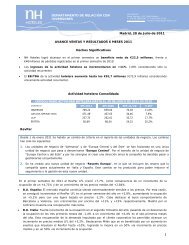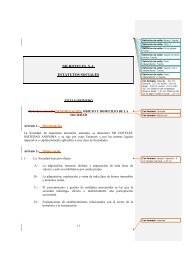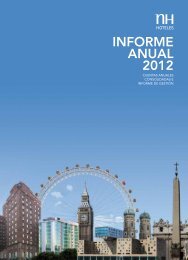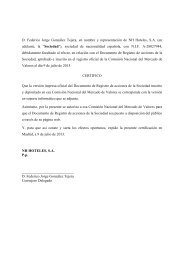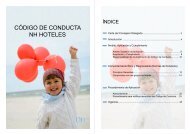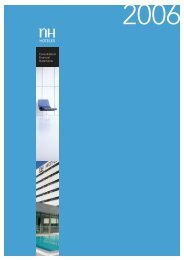Download Complete PDF - Informe Anual 2012
Download Complete PDF - Informe Anual 2012
Download Complete PDF - Informe Anual 2012
Create successful ePaper yourself
Turn your PDF publications into a flip-book with our unique Google optimized e-Paper software.
The Directors have assessed the potential future impacts of these standards, and consider that their entry into force will not have a significant<br />
impact on the consolidated annual accounts, except for the following:<br />
• IFRS 11 Joint Arrangements.<br />
IFRS 11 Joint Arrangements will replace IAS 31, which is currently in force. The fundamental change which IFRS 11 addresses with regard to<br />
the current standard is the elimination of the proportional consolidation option for jointly controlled entities, which would be consolidated by<br />
the equity method.<br />
This new rule will affect the Group’s consolidated annual accounts, since the proportional consolidation option has been used to consolidate<br />
joint ventures in its financial statements (see Note 2.5.3 and Annex III). Accordingly, the impact of consolidating these joint ventures by the<br />
equity method, instead of by proportional consolidation, would lead, in more significant items, to a smaller net turnover of €7,555 thousand,<br />
lower procurement costs of €5,961 thousand, reduced personnel expenses of €860,000 and smaller operating costs of €1,094 thousand, all<br />
calculated in reference to the current figures.<br />
• IFRS 12: Disclosure of interests in other entities.<br />
IFRS 12 is a disclosure standard which groups together all the accounting disclosure requirements on interests in other entities (be they<br />
subsidiaries, associated companies, joint ventures or other interests), including new disclosure requirements.<br />
Its entry into force would foreseeably broaden the disclosures currently required by the Group in relation to interests in other entities and other<br />
investment vehicles.<br />
2.2 Information on 2011<br />
As required by IAS 1, the information from 2011 contained in this consolidated annual report is presented solely for comparison with the<br />
information from <strong>2012</strong>, and consequently does not in itself constitute the Group’s consolidated annual accounts for 2011.<br />
2.3 Currency of presentation<br />
These consolidated financial statements are presented in euros. Any foreign currency transactions have been booked in accordance with the<br />
criteria described in Note 4.9.<br />
2.4 Responsibility for the information, estimates made and sources of uncertainty<br />
The Directors of the Parent Company are responsible for the information contained in these consolidated financial statements.<br />
Estimates made by the management of the Group and of the consolidated entities (subsequently ratified by their Directors) have been used in<br />
the Group’s consolidated financial statements to quantify some of the assets, liabilities, revenue, expenses and undertakings recorded. These<br />
estimates essentially refer to:<br />
- Losses arising from asset impairment.<br />
- The hypotheses used in the actuarial calculation of liabilities for pensions and other undertakings made to the personnel.<br />
- The useful life of the tangible and intangible assets.<br />
- The valuation of consolidation goodwill.<br />
- The market value of specific assets.<br />
- The estimation of onerous agreements.<br />
- Calculation of provisions and evaluation of contingencies.<br />
These estimates were made on the basis of the best available information on the facts analysed. Nonetheless, it is possible that future events<br />
may take place that make it necessary to modify them, which would be done in accordance with IAS 8.<br />
As is show in the balance sheet, current liabilities considerably exceed current assets. In addition, in <strong>2012</strong> the Group incurred losses of €292<br />
million.<br />
On 17 April 2013, as described under Note 31, the Parent Company completed the incorporation of China’s HNA Group into the share capital<br />
of NH Hoteles, S.A., through the subscription and payment of a capital increase of €234 million.<br />
Furthermore, on 30 April 2013 lender banks agreed to waive the Group’s obligation to comply with the financial ratios established in the<br />
syndicated loan agreement.<br />
The Directors of the Parent Company have reformulated these annual accounts following the going concern principle, since they consider that<br />
the Group will meet its payment obligations on their maturity date. It will do so by using the capital investment paid in last week by the HNA<br />
Group, by expanding the asset sale process, and through new capitalisation and financing transactions. It is confident that these operations<br />
will restore the financial equilibrium and profitability of the Group.<br />
2.5 Consolidation principles applied<br />
2.5.1 Subsidiaries (See Annex I)<br />
Subsidiaries are considered as any company included within the scope of consolidation in which the Parent Company directly or indirectly<br />
controls their management due to holding the majority of voting rights in the governance and decision-making body, with the capacity to<br />
exercise control. This capacity is shown when the Parent Company holds the power to manage an investee entity’s financial and operating<br />
policy in order to obtain profits from its activities.<br />
REPORT ON THE CONSOLIDATED FINANCIAL STATEMENTS 69



